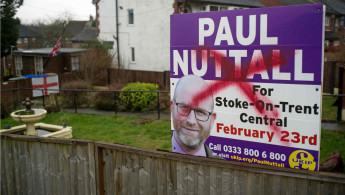Stoke by-election: 'Labour can't take Asian vote for granted'
"My generation will always vote Labour," he said.
"But I don't know about the next generation."
Labour are historically seen as the party of the working class - founded on socialist principles in 1900 and backed by the trade unions ever since. Whole swathes of traditional working class areas like Stoke-on-Trent have always voted in a Labour MP in regions referred to as the 'Labour heartlands'.
The South Asian population in particular have been considered a safe and reliable demographic by the Labour party for years. Any Labour candidate polling in a traditional South-Asian working class area has almost been guaranteed a seat - guaranteed that is, until the 2017 by-election in Stoke-on-Trent.
 |
Whole swathes of traditional working class areas have always voted in a Labour MP in regions known as the 'Labour heartlands'. |  |
English politico pundits have been discussing the 'strange lingering death' of Labour's presence in northern towns for a number of years, and Brexit may be accelerating its demise.
Stoke-on-Trent itself is often referred to as the 'capital of Brexit Britain' by the British newspapers. In last June's referendum, 69 percent of the Staffordshire town's electorate voted to leave the European Union (EU).
This trend extends to the Muslim demographic, which makes up a large slice of the South-Asian community. Many Muslim-owned businesses in the north of Britain came out in support of Brexit for a number of reasons - including a preference for immigration from outside the EU.
Yet despite this grass-roots support to leave, the Labour party establishment was resolute in its support to remain. Of Labour's 230 MPs at the time of the referendum, 213 signed up to a pro-EU "Labour In" campaign.
This disconnect with grassroots politics and the party's policies, particularly in the wake of the Brexit vote, has led to a popular feeling that the party does not represent its voters any more.
"People are fed up in Stoke-on-Trent - at the last election 61 percent of this constituency did not vote Labour," said Ed Fordham, the Liberal Democrat candidate's assistant.
"The death of Labour took place in 2015, it did not take place now - we're just at the burial."
 |
In the shadow of a populist win by President Donald Trump in the United States, the question of what follows is of great importance to many British South-Asians |  |
The rise of populist politics
In the shadow of a populist win by President Donald Trump in the United States, the question of what follows is of great importance to many British South-Asians, particularly Muslims. The next most popular party among the country's working class - the UK Independence Party (UKIP) is consistently linked to a culture of Islamophobia, bullying and general xenophobia.
The culmination of this culture hit when UKIP's previous leader, Nigel Farage, was photographed in front of a bill-board showing crowds of Arab refugees, titled "Breaking point: the EU has failed us all."
A union leader called the bill-board a "blatant attempt to incite racial hatred" and "scaremongering in its most extreme and vile form".
This undercurrent of racism can and does come out in Stoke-on-Trent's local politics. In the previous council, there were 9 councillors from the far-right xenophobic British Nationalist Party [BNP] sitting in City Hall.
In 2010, a crowd of English Defence League [a far-right political organisation] supporters clashed with anti-racism activists and members of the local community in Hanley - prompting the police to intervene.
And this is not going away - this reporter found a National Front graffiti sign in one of Stoke-on-Trent's most popular pubs, The Albion, which the pub owners had failed to remove entirely.
Gary Grimes, pub manager at The Albion pub said this was due to the pub's brewery requiring four weeks to complete any painting works.
 |
|
|
A National Front graffiti sign in The Albion pub, Stoke-on-Trent |
"We are very inclusive in this pub - the owners are a gay couple and we welcome everyone."
Undeterred by xenophobiaDespite the obvious xenophobic streak in UKIP, the party has still managed to attract Muslim voters away from Labour.
Owais Rajput ran as the UKIP's MP candidate in the constituency of Bradford East in 2015. A long-term Labour activist, he left the party in reaction to Labour's support for multiple wars in the Middle East.
"Ed Miliband and Tony Blair [the two previous Labour leaders] destroyed the Labour Party," said Rajput.
"I was a Labour activist and campaigner for 23 years, but after their scorched-earth policies in Iraq and elsewhere, I turned to UKIP."
Many Hanley residents said they knew of South Asian voters who had expressed support for UKIP on their doorsteps and beyond.
"I see a lot of Asians and black people knocking on doors and campaigning for UKIP," said Abdullah Idris, a Hanley resident.
Sitting in a barber shop, chatting football with a group of his friends, Idris says that UKIP still aren't really taken very seriously, hinting that the phenomenon may have more to do with protests against Labour's shortcomings.
"I don't see a UKIP victory coming - people will keep on voting for Labour or not vote at all."
 |
I don't see a UKIP victory coming - people will keep on voting for Labour or not vote at all |
 |
Still voting Labour... for now
The other alternative for voters is the Liberal Democrat party - the owners of the orange signs displayed in many of Hanley's shop windows.
In Mohammad Zamir's shop window, along with the vast majority of other shops in the majority South-Asian borough of Hanley in Stoke is a proudly emblazoned orange sign, reading 'vote Zulfiqar Ali - Liberal Democrat'.
"I will definitely be voting Labour at the next election," said Zamir.
"I only put the sign up because I wanted to support a community member and I can't say no to him."
Like Zamir, the inner intention among the majority of other shop owners here has remained red - Labour's party colours.
"I put the Lib Dems sign up because they asked me - I don't know if I'm even going to vote," said Mohammed Maskeen of Maskeen Barbers.
Rizwan Khan from Thomas and Co. Accountants also said he only put the sign up to support a local candidate - "I think I'm going to go with Labour."
When asked why they had put these signs up, again and again the shop owners said they wanted to support their local Muslim candidate - a potential lesson for the Labour party.
 |
Most resenting Labour supporters are defecting to apathy, rather than a viable rival |  |
Punished by apathy
But the majority of people this reporter spoke with mentioned they might not even vote because they felt that none of the candidates represented them.
"Of course people are going to vote in rebellion if you don't represent them," said one Pakistani lady who refused to give her name.
"Our MP in Newcastle-under-Lyme [a near-by town] didn't vote for Brexit but the majority of voters did. Aren't you supposed to vote on behalf of your constituents?"
Voter turn-out at the by-election on Thursday ended up at 38.2 percent, roughly in line with average turnout data since 1997, but still a remarkably low number.
According to the Liberal Democrat camp, this was almost certainly because the Labour candidate, Gareth Snell - who incidentally won - was an avid Remain supporter.
At another by-election on the same day, 150 miles north of Stoke-on-Trent in the Lake District borough of Copeland, this traditionally Labour 'safe seat' was taken by the Conservatives.
Sacha Ismail, a Labour activist, wrote after this defeat that the electorate had not associated with the candidate and that the Labour Party should have chosen a locally recognised left-wing activist.
Zamir of Shelton Fabrics agreed, saying that now is the time for Labour to come forward with accessible, representative candidates.
"I brought my children up to think independently and they will not instinctively vote Labour - the Labour party can't take them for granted any more."



